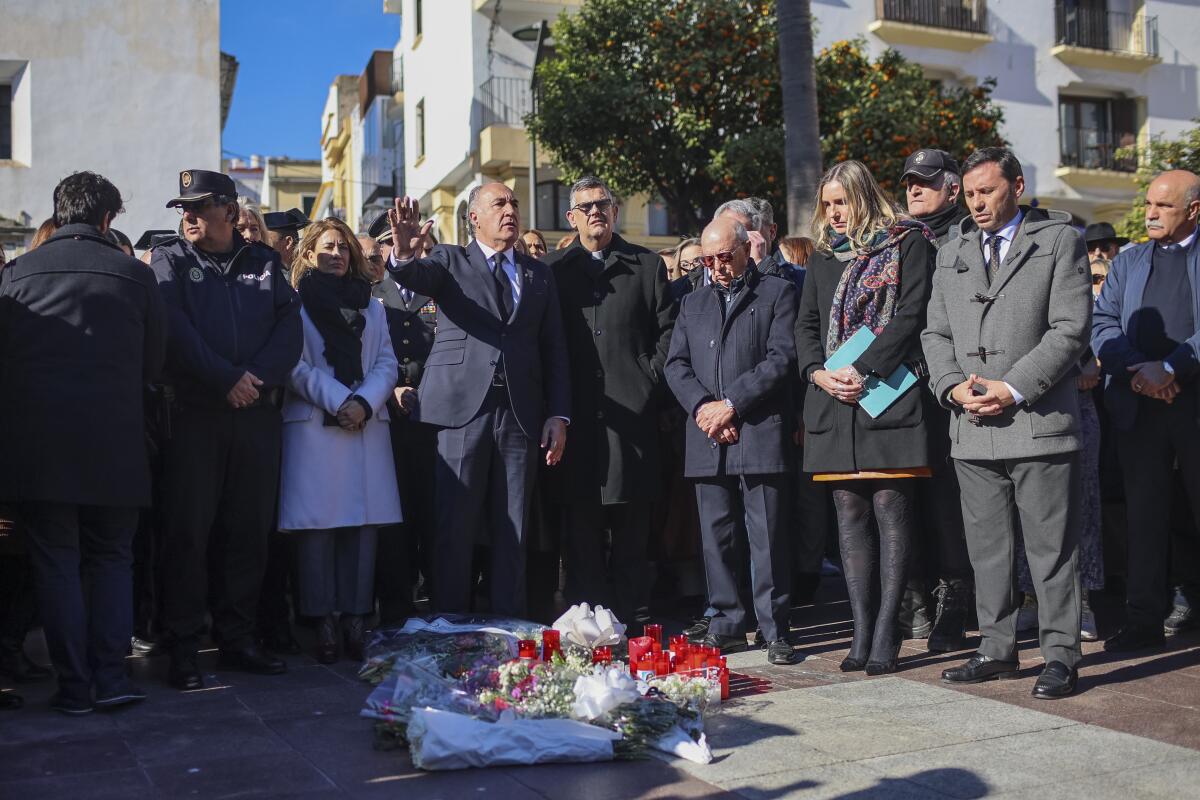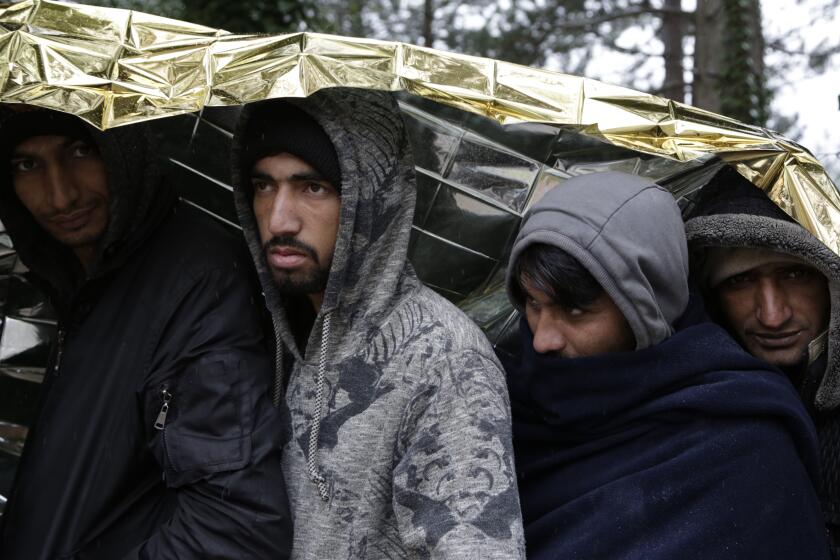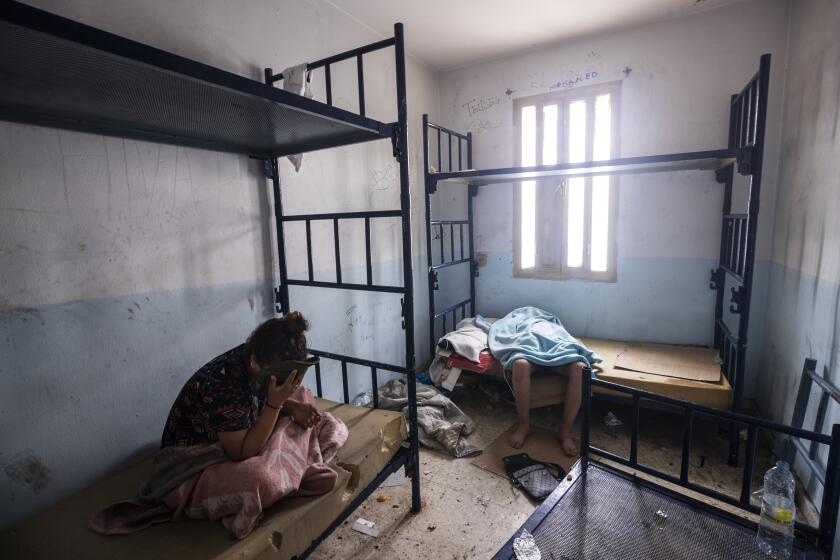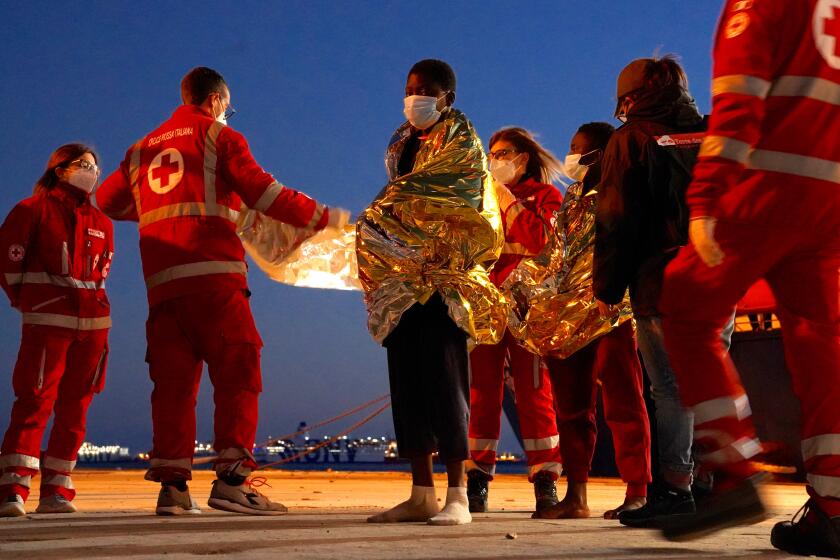Spanish police raid home of suspect in church machete attacks that killed one person

- Share via
ALGECIRAS, Spain — Police in Spain on Thursday raided the home of a man suspected of carrying out machete attacks at two churches that left one person dead and a priest seriously injured.
Police are still investigating the motive of the assault, but a National Court judge is investigating it as a possible act of terrorism. The suspect is believed to have acted alone.
Officers searched the as-yet-unnamed suspect’s home to “determine the nature, terrorist or otherwise,” of the Wednesday night attacks in the city of Algeciras, Spanish Interior Minister Fernando Grande-Marlaska said.
The suspect is a Moroccan citizen with no prior criminal record “either in Spain or any other country,” the Interior Ministry said. Investigators do not think anyone else was involved, Grande-Marlaska said. The suspect had been under a deportation order since June last year because of his unauthorized migrant status in Spain.
The attacks have shaken the city near the southern tip of Spain, across a bay from Gibraltar. Witnesses said that during the second attack, a machete-wielding man jumped on the altar of a church before chasing a victim into a city square and killing him.
The Interior Ministry said the man killed in the attack was a sacristan, an individual who prepares Mass, at the Church of Nuestra Señora de La Palma. A priest was wounded earlier at the Paris of San Isidro church.
The European Union’s border agency says the number of attempts by migrants to enter Europe without authorization reached around 330,000 last year.
Algeciras’ municipal government identified the slain sacristan as Diego Valencia and the wounded priest as Antonio Rodríguez.
The parish priest for Nuestra Señora de La Palma, the Rev. Juan José Marina, told Spanish media that he believes he was the attacker’s intended target.
“In the same way that he sought out the priest at San Isidro and no one else, the same thing happened here,” Marina said. “If I had been here, I would be dead.”
A fellow sacristan who served with Valencia at the church, Manolo González, recounted the events of his colleague’s slaying. The attacker climbed on the altar, he said, and Valencia came out “and asked to know what was going on.”
Caught in the diplomatic storm between Spain and Morocco are hundreds of Moroccan migrant youths whose relatives are frantically trying to find them.
Candles and flowers adorned the two small whitewashed churches Thursday, as residents nervously passed police vans waiting in the street. Flags were flown at half-staff in Algeciras, and a minute’s silence was held later in the day.
Algeciras is a multicultural port city and the first point of arrival for many boats from North Africa, putting it at the center of debates on irregular migration.
The Islamic Commission of Spain, a body that represents Muslims in the country, condemned an “abominable, murderous and heartless act” that took place in “a sacred space for our Catholic brothers in Algeciras.”
The violent acts at the churches may inflame social tensions stoked in an election year by the far-right Vox party, which is vying to win more local and national offices, as well as to form governing coalitions with the center-right Popular Party.
Start your day right
Sign up for Essential California for the L.A. Times biggest news, features and recommendations in your inbox six days a week.
You may occasionally receive promotional content from the Los Angeles Times.
Vox’s leader, Santiago Abascal, linked the attack to his party’s platform of cracking down on unauthorized immigration. Vox, the third-largest party in Spain’s parliament, presents itself as the protector of Spain’s Roman Catholic heritage in a time when active church membership is waning.
“He had an order of expulsion,” Abascal wrote on Twitter. “How many more like him could there be in Spain?”
But the regional president of southern Andalusia, Juanma Moreno of the Popular Party, said Algeciras has residents from 129 countries and had never experienced a similar attack.
“Nobody can [use this] to make generic statements about an ethnic or religious group,” Moreno said.
Slumping economies, conflict and lack of opportunity at home are pushing many young people across borders — even oceans.
The secretary general of the Spanish Episcopal Conference, an organization of Spain’s Catholic bishops, appealed for unity.
“We cannot demonize any group,” César García said, according to Spanish news agency EFE. “We cannot let ourselves be easily provoked, we cannot add fuel on the fire, we cannot lapse into demagogy and we cannot identify terrorism with any religion.”
More to Read
Sign up for Essential California
The most important California stories and recommendations in your inbox every morning.
You may occasionally receive promotional content from the Los Angeles Times.
















